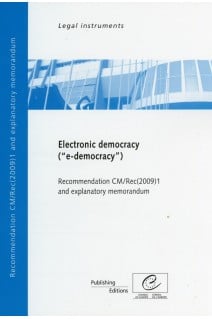Electronic democracy offers new opportunities to enhance public engagement and participation in democratic institutions and democratic processes. In this way, it helps empower civil society and improve policy-making procedures. E-democracy's strength lies in its capacity to facilitate both bottom-up and top-down initiatives, and its growth can contribute to a redefinition of political priorities and a transformation of the ways our local and global communities are governed.E-democracy initiatives are underway throughout Europe at all levels of governance in an effort to enhance transparency, accountability, access and dialogue. These developments, when seen as complementary to traditional channels of democratic participation, offer a means to improve governance and consequently reinforce public confidence and trust in democratic procedures and values.The Council of Europe has long taken the lead on digital policies relating to government action as exemplified by the Committee of Ministers Recommendation Rec(2004)15 on electronic governance and Recommendation Rec(2004)11 on legal, operational and technical standards for e-voting.This text on electronic democracy is based on the work of the Council of Europe Ad Hoc Committee on E-democracy (CAHDE). It provides a political and practical instrument for use by all organisations that are introducing, implementing and reviewing e-democracy.










